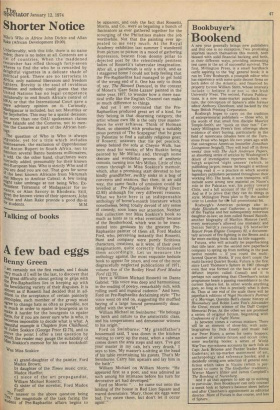Bookbuyer's
Bookend
A new year generally brings new publishers and this one is no exception. Two promising imprints launch themselves this month, both blessed with solid financial backing and both, in their different ways, providing interesting test cases in the art of successful survival. The first, Millington Press, is a small hardback outfit aspiring to the 'big' general book; it is run by Toby Roxburgh, a youngish editor who has experience with some quite decent firms on both sides of the Atlantic, and financed by property tycoon William Stern, whose interests include — believe it or not — the Irish University Press. The second, Futura Publications, is a new mass-market paparback venture, the conception of Sphere's able former editor Anthony Cheetham, and backed by the huge British Printing Corporation.
Roxburgh hopes to carry on the tradition of entrepreneurial publishers — those who, in the words of that small firm disciple Maurice Temple-Smith, are "quick on their feet." Certainly Millington Press's first otterings show evidence of alert buying, particularly in the field of Americana (shades here of the Turnstone Press who began life two years ago with that outrageous American bestseller Jonathan Livingstone Seagull). They will lead off in three weeks' time with The Jack Anderson Papers, an absorbing series of articles by Washington's doyen of investigative reporters which Roxburgh acquired 'sight unseen' (which, in publishing jargon, means he bought it without having read it — a practice in which several legendary publishers persisted throughout their working life). The book, it now transpires, will include some strong new material on Nixon's role in the Pakistan war, his policy toward !Chile, and 'a full account of the ITT scandal. And as if to prove that they can do things in style, Millington Press plan to fly the author over to London for tile full promotional bit.
Roxburgh's American pickings also include Elizabeth and Catherine, a biography of the Tsarina and her subsequently notorious daughter-in-law; an item called Sexual Suicide; another biography of Marilyn Monroe (well, every newcomer's allowed one mistake); and Dennis Smith's resounding US bestseller Report From Engine Company 82, a documentary account of fire-fighting in the Bronx and a far more exciting book than its title suggests.
Futura, who will actually be paperbacking that title later, are the second new paperback company to spring up from nothing in the past twelve months — if you count the multifaceted Quartet Books. If you don't count the multi-faceted Quartet Books, Futura is the first since Lord Thomson's Sphere in 1967 (though even that was formed on the back of a now defunct imprint called Consul) and it is perhaps not surprising that Cheetham's initial programme bears a passing resemblance to the current Sphere list. In other words anything goes, so long as that is precisely what it does do. Thus at one end of the scale there will be paperback editions of Nigel Nicolson's Portrait of a Marriage, Quentin Bell's classic history of Bloomsbury and Robin Lane Fox's Alexander the Great, recent winner of the Duff Cooper Memorial Prize. At the other we are promised a series of original fiction, beginning with Confessions of a Night Nurse.
In between comes a curious mixture. There will be an element of show-biz, with autobiographies by Dick Emery and music hall star Peter Honri; a series for teeny boppers; a number of science fiction and occult titles; some sea-faring books; a series of World War Two eye-witness accounts by such folk as . Capt Jack Broome and Panzer leader Heinz Guderian; an up-market assortment of art, anthropology and reference books; and a decidedly strong-arm selection of general nonfiction which takes in Vizzini (which is purported to come in The Godfather tradition), Werner Maser's Hitler and James Campbell's The Bombing of Nurenburg.
And it all that appears to add up to nothing in particular, then Bookbuyer can only counsel a sneak look at Sphere's balance sheet before and after Cheetham's appointment as editorial director. More of Futura in due course, and less of Sphere.


































 Previous page
Previous page